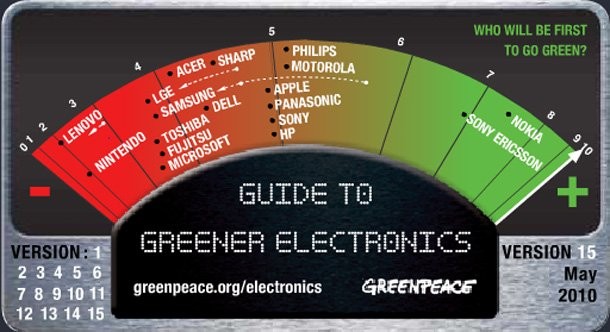Our extra-large special edition is here. Subscribe today and receive the 25% longer issue at no extra cost!
Greenpeace Releases Latest Eco-Rankings, Nintendo Still In Last Place

Greenpeace has released its quarterly Guide to Greener Electronics, and while game-console manufacturers have made some progress over the past few months, the environmental group’s findings say that Nintendo, Microsoft, and Sony still have quite a ways to go.
Greenpeace says it ranks the electronics companies based on public information available on their websites. Companies score points for doing things such as eliminating hazardous materials from the manufacturing process, recycling obsolete products, and reducing their overall impact on the environment.
According to the organization, Nintendo is still the worst offender of the electronics companies – coming in at 18th place. Since it was added to the listings in December 2007, Nintendo has taken last place each time, and the May 2010 report is no different. Its score has been bumped up to 1.8 out of 10, which is slightly better than the 1.4 rating it earned in the last report. That increase was due to the way the company is now managing chemicals and for its openness in making those policies available to the public. While Nintendo has created consoles that use PVC-free wiring, it hasn’t set a timeline on phasing out those materials entirely. Nintendo also took a hit for its handling of e-waste, a category in which it continues to score zero. While the company has committed to reducing its carbon dioxide output, its CO levels rose 1.5 in 2007 over 2006. The DSi’s low power AC adapter does meet Energy Star requirements for external power supplies, which helped the company score points for energy criteria.
Microsoft is the next worst offender in the games space, coming in at 16th place. Its policies have earned it 3.3 points this quarter, up from 2.4. That increase was enough for Microsoft to leapfrog over Lenovo, which is now in 17th. Most of those points can be attributed to its support in cutting greenhouse gas emissions and for also providing third-party verification of its emissions. Greenpeace says that Microsoft does a better job of communicating to consumer how to recycle its older products. That level of communication doesn’t extend to its relationships with its suppliers, however, since the company hasn’t told them that PVC plastics are on its restricted substances list for hardware.
Sony has lost points over the past few months, though its overall position on Greenpeace’s list has risen. It’s now in the 6th position, up from its last ranking at 7th. Sony took a hit for not expanding its recycling program to those outside of the Organization for Economic Co-operation and Development nations, and for providing verification on its greenhouse gas emissions. Greenpeace did recognize the company’s efforts to reduce those emissions, giving points for its work to cut them down 17 percent between 2000 and 2008. It also earned recognition for manufacturing PVC- and BFR-reduced models of consumer electronics, such as cameras, PCs, and video recorders. However, according to Greenpeace, Sony hasn’t supported a ban on PVC.
Each of the big three have made improvements over the past few months, though they still have considerable work to do if they want to move past Nokia and its 7.5 score. We’ll see how they do in the next quarter. It's hard to say how much of an incentive manufacturers have to make substantial changes to their production processes, since components such as PVC-free wiring can be more expensive. Regardless, expect to continue seeing announcements of eco-friendly modifications to game cases and game-related items in the future. Those kinds of changes are good PR, save companies money, and are easier for most people to grasp than arcane details of what's in the guts of a console.

Get the Game Informer Print Edition!
Explore your favorite games in premium print format, delivered to your door.
- 10 issues per year
- Only $4.80 per issue
- Full digital magazine archive access
- Since 1991









